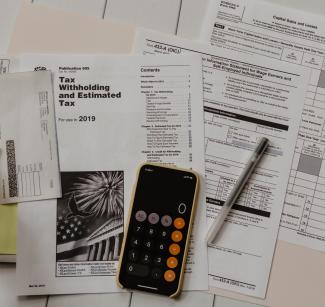
6 Easy Organization Tips to Take Time off of Taxes
As the saying goes there are two things that are inevitable: death and taxes. And, out of those two sure things, you can only really plan for your taxes. It should be no surprise when tax season surely and steadily rolls around again, yet every year there are plenty of individuals who file for a tax extension (in 2014 there were approximately 12 million Americans who did so). Whether you’re one of the 36.8 percent of Americans who hire someone to file taxes for you or 34.5 percent who use a digital tax filing tool (like TurboTax), you’re going to need to have the correct numbers and forms in order. Every little time saver helps when it takes the average individual more than 21 hours to assemble and fill out their annual tax return. Forget rushing, stressing, and floundering to get taxes filed by Tax Day with the following easy organization tips.
- Put important tax dates on the calendar. April 15 is emblazoned in our minds like our mother’s birthday or our anniversary, but there are other dates during tax season to remember. For example, any 1098, 1099, or W-2s are supposed to be mailed by January 31. (Also, it doesn’t hurt to check what day of the week April 15 falls on. If it falls on a weekend or holiday Tax Day will be the following business day.) When marking your calendar check the dates for the upcoming tax season of the last days to fully fund your retirement accounts (traditional and Roth IRAs). Other accounts, like a Keogh or SEP, have a separate filing extension date, so check that date too. (A simple Google search should suffice.) If you did apply for and receive a tax-filing extension be certain to set an alarm at least a month out from the October date.
- Create a filing system. It doesn’t matter what sort of filing system you use, just that you use something that works for you—folders, sticky notes, digital files. Whatever you choose, stick with it and be vigilant about grouping your receipts, files, and important paperwork. If you do choose to go all paperless you’ll want to keep a physical paper trail as well as insurance in case of an audit.
- Learn your deductions. At 74,608 pages, the federal tax code is not interesting, nor engaging reading. Depending on your job(s), certain sections of the tax code and the corresponding deductions are going to be of greater interest to you than others. Claiming deductions benefits your bottom line by reducing your taxable income, resulting in less taxes owed to the federal government. Consult with a certified tax planner (a type of financial advisor), and do your own research to find out what you can and should be claiming on your taxes. (An online guide like Tax Receipts is a good place to start.)
- Keep the receipts. Once you know what you can deduct, then you can properly keep the receipts needed to claim those deductions. File them within the system you created and consider scanning them into a digital folder in the case that they would get damaged, lost, or faded. Itemize, or categorize them, into the tax areas you know you may claim such as “Donations,” “Office Supplies,” and “Travel.”
- Reduce clutter. One of the greatest inhibitors to organization is clutter. In the case of your taxes that clutter is going to be all the forms, documents, and receipts that you no longer need but are still hanging onto. The end of the tax year, or after you file, is a good time to take stock of what you need to keep for future years versus what’s superfluous. If you’re someone who keeps your pay stubs from each pay period use them to double-check the total on your W-2 and then shred them. With your online bank account, there’s no need to keep monthly paper statements past the end of the tax year, unless a critical financial event occurred and you think you may need paper (or a scanned copy) for reference. (You’ll want to hang on to voided checks just in case.) The same advice (electronic versions over paper if possible) goes for investment statements and loan interest statements. As for those pesky paper receipts, once you have filed and scanned the receipts, these are good to be shredded.
- Consider cashing out. Undoubtedly cash is easy to use if you have it on hand, but if you’re buying something that may be part of your deductions, it’s a best practice to use a debit or credit card for easier tracking of the expenditure in case of an audit.
Resources
1. https://blog.mint.com/how-to/how-to-organize-your-tax-records-and-receip...
2. http://money.howstuffworks.com/personal-finance/personal-income-taxes/ho...
3. http://www.quickanddirtytips.com/money-finance/saving-spending/3-steps-f...
4. http://www.cbsnews.com/news/how-to-organize-your-tax-records-now/
5. https://www.entrepreneur.com/article/225900
*This content is developed from sources believed to be providing accurate information. The information provided is not written or intended as tax or legal advice and may not be relied on for purposes of avoiding any Federal tax penalties. Individuals are encouraged to seek advice from their own tax or legal counsel. Individuals involved in the estate planning process should work with an estate planning team, including their own personal legal or tax counsel. Neither the information presented nor any opinion expressed constitutes a representation by us of a specific investment or the purchase or sale of any securities. Asset allocation and diversification do not ensure a profit or protect against loss in declining markets. This material was developed and produced by Advisor Websites to provide information on a topic that may be of interest. Copyright 2014-2016 Advisor Websites.
Financial Management, Inc. is a registered investment adviser. Information presented is for educational purposes only and does not intend to make an offer or solicitation for the sale or purchase of any specific securities, investments, or investment strategies. Investments involve risk and, unless otherwise stated, are not guaranteed. Be sure to first consult with a qualified financial adviser and/or tax professional before implementing any strategy discussed herein. Past performance is not indicative of future performance.
Investment Advice and Financial Planning offered through Financial Management Inc.
Financial Management Inc. utilizes multiple custodians and firms throughout the industry.

